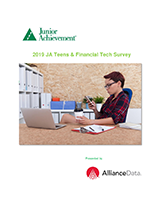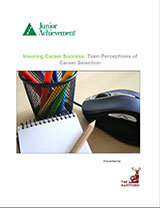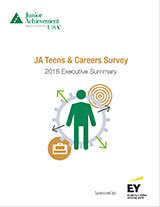Junior Achievement’s thought leadership
JA is proud to be a thought leader in future-readiness education for today’s youth. Explore our studies and white papers below.
recent studies
White Papers
2021 JA Teens Back-to-School Survey
The impact of the COVID-19 pandemic goes beyond the disruptions students experienced during the 2020-21 school year and possibly into the current one. The “new normal” America’s youth experienced in education, including the uneven quality of and access to remote, hybrid, and virtual learning, combined with the lack of regular social interaction with peers, teachers, and mentors, may have long-term impacts on countless students’ educational achievement and overall wellbeing.
Why JA? And Why Now?
Junior Achievement’s response to the uncertainty and inequity facing Gen Z.
JA Alumni Experience (2020)
A new survey of 1,002 Junior Achievement alumni conducted by Ipsos finds that JA had a strong impact on JA alumni’s professional and personal development into adulthood and the working-world. Half of JA alumni (53%) report having started or partnered in their own business venture and about half who had a volunteer in their program say ended up working in the same field as their JA volunteer (51%). Two-thirds of JA alumni report they support the program as adults (66%) through volunteering time on boards or in classrooms, donating money, or working directly with JA staff.
The States of Entrepreneurship Report (2019)
How many states offer or even require entrepreneurship education programs? This report provides an informative overview.
2019 Teens & Financial Technology
How are today's teens using technology to manage their money? This survey from Junior Achievement and Alliance Data asks that question, and more.
Insuring Career Success: Teen Perceptions of Career Selection
What do you want to be when you grow up? It's an question we have all been asked, but selecting a career is a decision many teens and young adults tend to put off, as discovered in this research.
Trends in the Number, Share, and Characteristics of Disconnected Youth: Implications for Future Policies and Programs
"Disconnected Youth" are defined as those between the ages of 16 and 24 who are not employed nor enrolled in school. This research, conducted by the Population Reference Bureau for Junior Achievement USA, explores how those characteristics have changed since 1970 and touches upon implications for future policies and programs.
Meeting a Critical Need: The Impact of Blended Learning Programs
Technology in the classroom is changing the way students learn and teachers teach. This white paper, done in conjunction with eSchoolNews, explores how blended learning is impacting young people's attitudes and behavior related to money management.
2018 JA TEENS & COLLEGE SAVINGS SURVEY
Teens may think they are ready for college, but are they prepared to pay for higher education? This JA Teens and College Savings survey explores how ready today's young people are to make one of the biggest investments of their lifetime.
JA Teens and Retirement Survey (2018)
Today's 18-year-olds could start contributing to a 401K or Roth IRA with their first job, but many won't. This survey explores teens' knowledge and attitudes when it comes to saving for retirement.
2018 Teens and Careers survey
This survey of 13 to 17-year-olds explores teens’ interests in career paths, the attraction from influencers towards specific industries, such as STEM, and accessibility to work-readiness and financial-preparedness courses.
The 2018 JA Teens & Personal Finance Survey
Junior Achievement USA and AIG surveyed 1,000 teens between the ages of 13 and 18 to gain a better understanding of their perceptions as they relate to personal finance and financial decision making. This is a summary of those findings.
JA Teens and Entrepreneurship Survey (2017)
Junior Achievement USA and EY joined to survey parents and teens about their opinions regarding entrepreneurship. The survey was conducted by ORC International, with more than 1,000 teens and 1,000 parents of teens participating. This is a summary of those findings.
JA Alumni report (2016-2017)
Junior Achievement USA (JA®) conducted a survey of a scientifically valid sample of more than 700 JA® Alumni. The intent of this research was to better understand the impact JA® has had on the lives of the more than 100 million people who have gone through Junior Achievement programs since the organization’s founding in 1919. The JA® Alumni were asked about a variety of topics, including educational attainment, career satisfaction, financial capability, income levels, and business ownership. These results were then compared to general population data from a variety of sources, including the U.S. Census, the U.S. Department of Education, and the Global Entrepreneurship Monitor. This report summarizes those findings.





















It is never too early to start teaching children about money and finances, and Junior Achievement of Greater Washington said parents have many effective opportunities by just including children in family expenses.